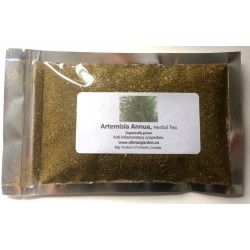
Health Benefits of Artemisia annua
What Is Artemisia annua?
Artemisia annua, commonly known as Qing Hao, Sweet Wormwood or Sweet Annie, is an herb used in traditional Chinese medicine for centuries. Its leaves and flowers contain powerful bioactive compounds—most notably artemisinin—which have been studied for a wide range of medicinal uses.
While today it is best known as the source of artemisinin-based treatments for malaria, the potential benefits of A. annua go far beyond that.
Key Benefits
Here are some of the most promising uses of Artemisia annua, supported by research to some degree:
-
Anti-malarial & Anti-parasitic:
Artemisinin, derived from A. annua, is a key ingredient in many anti-malarial therapies. It works by damaging the malaria parasite through a chemical reaction inside infected blood cells.
It also shows activity against other parasites in preliminary studies. -
Anti-inflammatory & Antioxidant Properties:
A. annua contains flavonoids and phenolic compounds that help reduce inflammation.
Lab-based studies suggest it neutralizes free radicals and has antioxidant effects that may support long-term health. -
Support for Arthritis & Joint Health:
Some small studies (including human pilot trials) suggest A. annua extracts may help improve joint mobility and reduce pain in people with arthritis. -
Blood Sugar Control:
In animal studies, sweet wormwood has been shown to help regulate blood glucose levels. This suggests possible anti-diabetic benefits, though human research is limited. -
Gut & Immune Support:
Studies in animals (such as livestock or poultry trials) show that A. annua may promote healthier gut microbiota, reduce harmful bacteria, and strengthen immune markers.
It also appears to help with reducing some inflammatory markers in the digestive tract.
Important Cautions & Safety
While Artemisia annua has many promising benefits, there are a number of important caveats to consider:
-
Pregnancy & Breastfeeding: Some sources recommend avoiding or limiting its use during pregnancy.
-
Potential Side Effects: Some reports include dizziness, liver effects, or allergic reactions.
-
Medication Interactions: Because it has strong biological activity, A. annua may interact with other medicines—especially those for blood sugar, liver function, or inflammatory conditions.
-
Dosage & Form: Many studies use concentrated extracts, not simply drinking the plant as tea. Effects may vary depending on dose, whether you’re using dried leaves, tea, capsules, or more refined extracts.
How to Use Artemisia annua
If you’re considering using A. annua, here are some common forms & tips:
-
Tisane or Infusion: Dried leaves can be brewed to make herbal tea. It has a slightly bitter taste.
-
Tincture or Extract: More concentrated forms offer stronger effects, but also carry more risk of side effects or interactions.
-
Dosage & Cycle: Some practitioners recommend pulsing use (e.g. cycles where the herb is used for a number of days, followed by a break) rather than continuous daily intake. (This is a traditional herbal strategy to avoid tolerance or reduce risk.)
Final Thoughts
Artemisia annua is a fascinating plant with an impressive history—and modern science is confirming many traditional uses. While its anti-malarial properties are well established, newer research into its anti-inflammatory, antioxidant, digestive and immune-support effects is promising.
That said, it is not a “cure-all”. If you’re using it for wellness or therapeutic purposes, treat it with respect. Use it responsibly, pay attention to dosages, and always consult a health professional if you have chronic conditions, are pregnant, or take other medications.


Leave a Comment